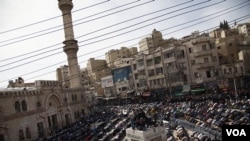AMMAN, JORDAN —
Angry Jordanians, fed up with economic constraints that have led to higher gas prices, took their ire out on their king in recent days in mass protests - a rare public display against the monarchy.
The protests in Amman are of great concern to the West, where King Abdullah is widely seen as the guarantor of stability - not only in Jordan, but in the tense Middle East. Protestors have different concerns, however, according to political analyst Labib Kamyahi.
“The issue is the silent majority which is the crux of the opposition in Jordan. A lot of people are not happy and they are angry - they are secular - and most of their resentments come from economic hardships and corruption in the country. Also people are very upset at - if they want to read the future it is doom and gloom,” said Kamyahi.
Related video by Elizabeth Arrott in Amman
As political change has rolled through the Middle East, Western observers assumed Jordan would remain unaffected. Increasingly, that opinion seems short-sighted.
King Abdullah has fired four prime ministers in the last year and has backed an election law that reduces the independence and influence of opposition parties. His popularity is diminishing as popular protests grow.
The main problem is economic. These latest demonstrations were sparked by cuts in government subsidies for basic goods including gasoline - cuts demanded by the International Monetary Fund. Prices are rising quickly, plunging many Jordanians into economic crisis.
With Washington watching closely, the king has promised political reforms to mute internal criticism. But so far they have been little more than cosmetic.
“It’s like they swallowed the reform program initially and they produced it in a modified form that did not satisfy the ambition of the Jordanian people, especially when it comes to the two issues of corruption and democracy. On these two fronts the regime failed miserably,” said political analyst Labib Kamyahi.
And that failure has left the door open for the opposition Muslim Brotherhood, whose street level social programs have created a strong constituency among the poor. The government publicly calls them irrelevant, yet keeps a close watch.
The Deputy Head of the Muslim Brotherhood, Zaki Bani Rusheidi, said that group wants reform, not an overthrow of the regime - but warns that the Brotherhood cannot be ignored.
“We are for freedom of religion, opinion, pro-democracy. These are our demands, whether we are a majority or a minority in the parliament. The West’s interests lies with the people, not with dictators,” said Rusheidi.
Abdullah clearly is facing a growing backlash at home. And at a time of great upheaval in neighboring nations, there also is increased worry in the West about Jordan's future.
Photo Gallery: Jordan Protests
The protests in Amman are of great concern to the West, where King Abdullah is widely seen as the guarantor of stability - not only in Jordan, but in the tense Middle East. Protestors have different concerns, however, according to political analyst Labib Kamyahi.
“The issue is the silent majority which is the crux of the opposition in Jordan. A lot of people are not happy and they are angry - they are secular - and most of their resentments come from economic hardships and corruption in the country. Also people are very upset at - if they want to read the future it is doom and gloom,” said Kamyahi.
Related video by Elizabeth Arrott in Amman
As political change has rolled through the Middle East, Western observers assumed Jordan would remain unaffected. Increasingly, that opinion seems short-sighted.
King Abdullah has fired four prime ministers in the last year and has backed an election law that reduces the independence and influence of opposition parties. His popularity is diminishing as popular protests grow.
The main problem is economic. These latest demonstrations were sparked by cuts in government subsidies for basic goods including gasoline - cuts demanded by the International Monetary Fund. Prices are rising quickly, plunging many Jordanians into economic crisis.
With Washington watching closely, the king has promised political reforms to mute internal criticism. But so far they have been little more than cosmetic.
“It’s like they swallowed the reform program initially and they produced it in a modified form that did not satisfy the ambition of the Jordanian people, especially when it comes to the two issues of corruption and democracy. On these two fronts the regime failed miserably,” said political analyst Labib Kamyahi.
And that failure has left the door open for the opposition Muslim Brotherhood, whose street level social programs have created a strong constituency among the poor. The government publicly calls them irrelevant, yet keeps a close watch.
The Deputy Head of the Muslim Brotherhood, Zaki Bani Rusheidi, said that group wants reform, not an overthrow of the regime - but warns that the Brotherhood cannot be ignored.
“We are for freedom of religion, opinion, pro-democracy. These are our demands, whether we are a majority or a minority in the parliament. The West’s interests lies with the people, not with dictators,” said Rusheidi.
Abdullah clearly is facing a growing backlash at home. And at a time of great upheaval in neighboring nations, there also is increased worry in the West about Jordan's future.
Photo Gallery: Jordan Protests





